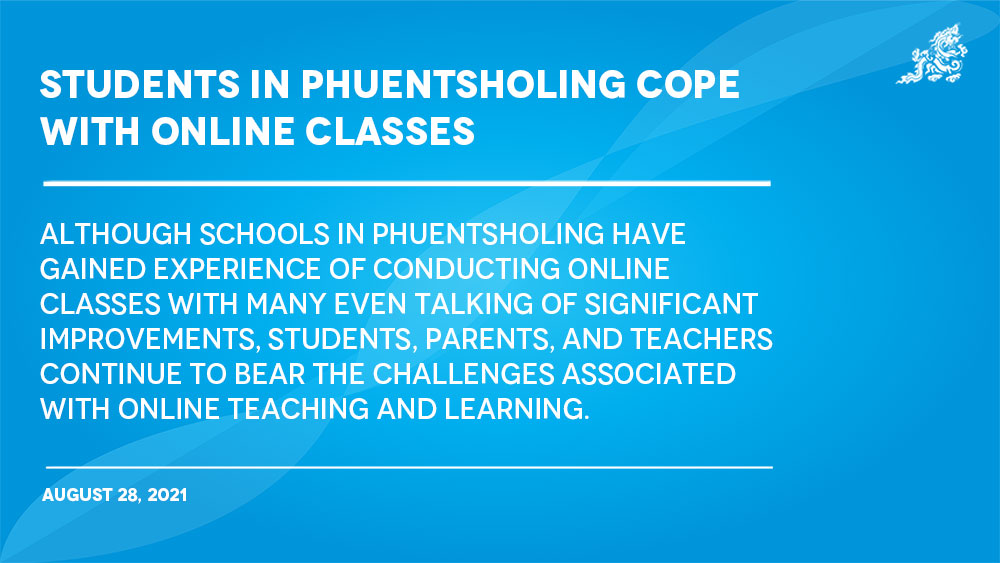Rajesh Rai | Phuentsholing
Although schools in Phuentsholing have gained experience of conducting online classes with many even talking of significant improvements, students, parents, and teachers continue to bear the challenges associated with online teaching and learning.
With students from classes IX to XII recently relocated to Punakha, the burden continues for students of classes PP to VIII.
While some students don’t have smartphones, parents who have smartphones face difficulties in recharging data packages.
While there are assumptions that parents are helping children do their online work, working parents say they don’t have enough time to teach or guide their children and uneducated parents say they cannot be of any help to their children.
A 33-year-old woman said she and her husband are both uneducated and have a difficult time guiding their child these days.
“Our child also doesn’t do his work on time,” she said, adding that she forces him to sit and complete his work.
She tried to relocate their child from a school in Phuentsholing to a school under Phuentsholing gewog, where the school continues contact learning, but she didn’t get the admission.
It was learnt that many parents took their children out of Phuentsholing to continue their studies in various parts of the country.
After the border gate was closed in March last year, schools in Phuentsholing were closed and online classes were commenced. Later in September 2020, students from class IX to XII were relocated to schools in Punakha and Wangdue. However, they were brought to Phuentsholing for the 2021 academic session.
Contact learning continued until April 16 this year until the town was put under the third lockdown on April 17. The lockdown prolonged until August 10.
With students from classes IX to XII relocated, there are 2,750 students from class PP to VIII.
Although the government said they would conduct blended teaching-learning, schools have not reopened yet.
A teacher said that online classes seem to be effective only to those “above-average students” and hardworking ones. “Those academically weak take online classes for granted.”
The teacher also said assessment is not fair as many students share their work with each other and some of the parents are doing the work for students.
Another teacher said many parents used smartphones that do not support many teaching apps used by the teachers. “Many parents do not own smartphones.”
There have been instances where schools and teachers have volunteered to look for sponsors to fund for smartphones for the needy students.
While teachers and parents said online classes have improved compared to last year, teachers said they still cannot validate whether students are actually doing their work or if it was their parents, as a few weaker students had performed better than the good students.
A principal said the biggest challenge is to have all the students online.
“They come online but they are offline after sometime,” the principal said, adding there could be many reasons such as the network and internet data issues. “Teachers have to call. It is also difficult to meet parents now and then.”
From sending the lessons online, uploading, downloading, and correcting, online classes require prolonged time.
“It is tedious work. Teachers spend long hours onscreen and even complain of eye problems,” a teacher said.
Parents are also worried about children spending more time online.
A parent, Sonam, said students also spend more time on smartphones, which is unhealthy.
“Children lack the discipline they would have in school. I have to thrash my son.”
Some parents are not confident their children will perform this year. Classes VI and VIII have to sit for board exams.
A businessman said exam papers would be as per classroom teaching while the students are learning online. “How are they going to compete?” he said. “The exam papers must be designed considering online classes. Otherwise, many will fail.”


